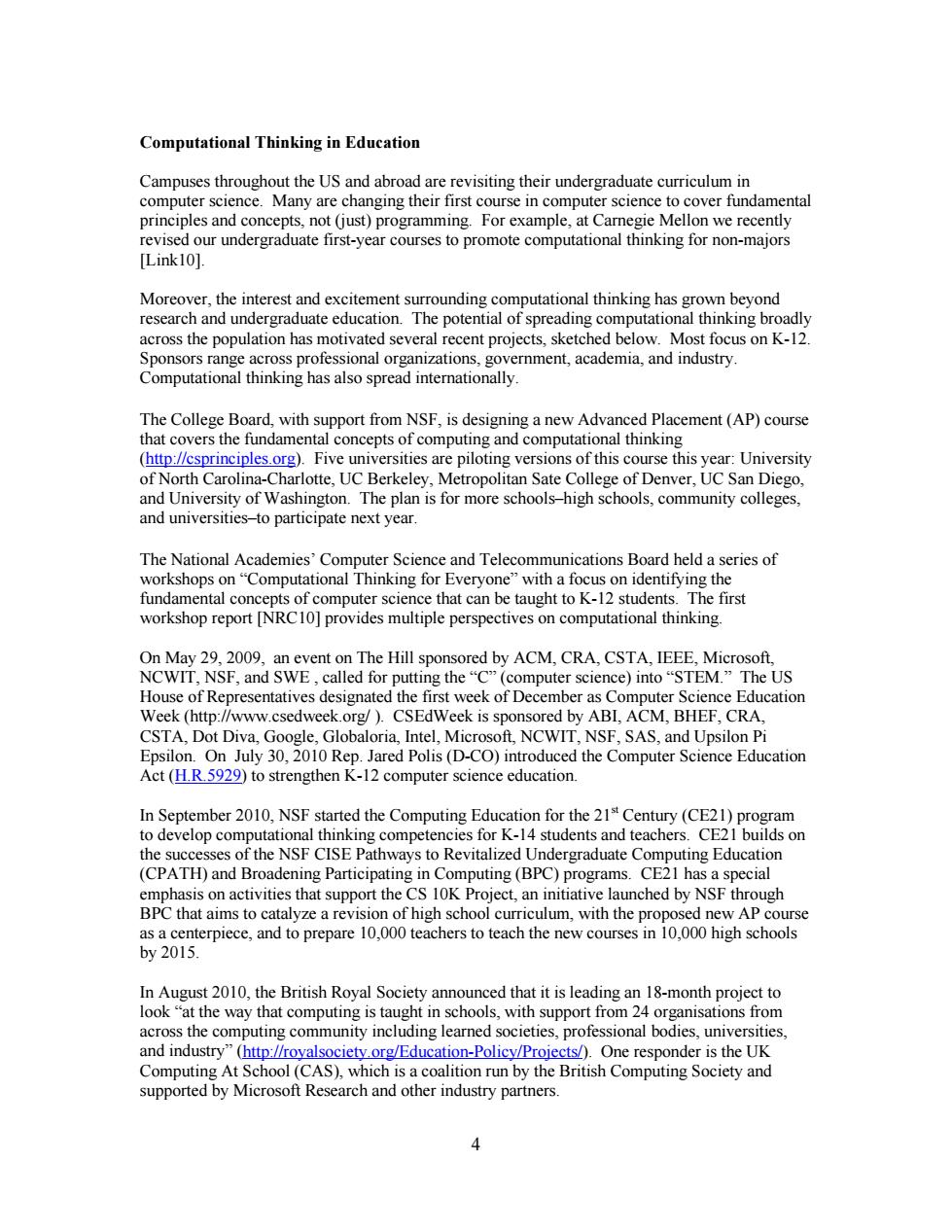正在加载图片...

Computational Thinking in Education Campuses throughout the US and abroad are revisiting their undergraduate curriculum in computer science.Many are changing their first course in computer science to cover fundamental principles and concepts,not (just)programming.For example,at Carnegie Mellon we recently revised our undergraduate first-year courses to promote computational thinking for non-majors [Link10]. Moreover,the interest and excitement surrounding computational thinking has grown beyond research and undergraduate education.The potential of spreading computational thinking broadly across the population has motivated several recent projects,sketched below.Most focus on K-12. Sponsors range across professional organizations,government,academia,and industry. Computational thinking has also spread internationally. The College Board,with support from NSF,is designing a new Advanced Placement(AP)course that covers the fundamental concepts of computing and computational thinking (http://csprinciples.org).Five universities are piloting versions of this course this year:University of North Carolina-Charlotte,UC Berkeley,Metropolitan Sate College of Denver,UC San Diego, and University of Washington.The plan is for more schools-high schools,community colleges, and universities-to participate next year. The National Academies'Computer Science and Telecommunications Board held a series of workshops on"Computational Thinking for Everyone"with a focus on identifying the fundamental concepts of computer science that can be taught to K-12 students.The first workshop report [NRC10]provides multiple perspectives on computational thinking. On May 29,2009,an event on The Hill sponsored by ACM,CRA,CSTA,IEEE,Microsoft, NCWIT,NSF,and SWE,called for putting the"C"(computer science)into"STEM."The US House of Representatives designated the first week of December as Computer Science Education Week(http://www.csedweek.org/).CSEdWeek is sponsored by ABI,ACM,BHEF,CRA, CSTA,Dot Diva,Google,Globaloria,Intel,Microsoft,NCWIT,NSF,SAS,and Upsilon Pi Epsilon.On July 30,2010 Rep.Jared Polis(D-CO)introduced the Computer Science Education Act(H.R.5929)to strengthen K-12 computer science education. In September 2010,NSF started the Computing Education for the 21s Century(CE21)program to develop computational thinking competencies for K-14 students and teachers.CE21 builds on the successes of the NSF CISE Pathways to Revitalized Undergraduate Computing Education (CPATH)and Broadening Participating in Computing(BPC)programs.CE21 has a special emphasis on activities that support the CS 10K Project,an initiative launched by NSF through BPC that aims to catalyze a revision of high school curriculum,with the proposed new AP course as a centerpiece,and to prepare 10,000 teachers to teach the new courses in 10,000 high schools by2015. In August 2010,the British Royal Society announced that it is leading an 18-month project to look"at the way that computing is taught in schools,with support from 24 organisations from across the computing community including learned societies,professional bodies,universities, and industry"(http://royalsociety org/Education-Policy/Projects/).One responder is the UK Computing At School (CAS),which is a coalition run by the British Computing Society and supported by Microsoft Research and other industry partners.4 Computational Thinking in Education Campuses throughout the US and abroad are revisiting their undergraduate curriculum in computer science. Many are changing their first course in computer science to cover fundamental principles and concepts, not (just) programming. For example, at Carnegie Mellon we recently revised our undergraduate first-year courses to promote computational thinking for non-majors [Link10]. Moreover, the interest and excitement surrounding computational thinking has grown beyond research and undergraduate education. The potential of spreading computational thinking broadly across the population has motivated several recent projects, sketched below. Most focus on K-12. Sponsors range across professional organizations, government, academia, and industry. Computational thinking has also spread internationally. The College Board, with support from NSF, is designing a new Advanced Placement (AP) course that covers the fundamental concepts of computing and computational thinking (http://csprinciples.org). Five universities are piloting versions of this course this year: University of North Carolina-Charlotte, UC Berkeley, Metropolitan Sate College of Denver, UC San Diego, and University of Washington. The plan is for more schools–high schools, community colleges, and universities–to participate next year. The National Academies’ Computer Science and Telecommunications Board held a series of workshops on “Computational Thinking for Everyone” with a focus on identifying the fundamental concepts of computer science that can be taught to K-12 students. The first workshop report [NRC10] provides multiple perspectives on computational thinking. On May 29, 2009, an event on The Hill sponsored by ACM, CRA, CSTA, IEEE, Microsoft, NCWIT, NSF, and SWE , called for putting the “C” (computer science) into “STEM.” The US House of Representatives designated the first week of December as Computer Science Education Week (http://www.csedweek.org/ ). CSEdWeek is sponsored by ABI, ACM, BHEF, CRA, CSTA, Dot Diva, Google, Globaloria, Intel, Microsoft, NCWIT, NSF, SAS, and Upsilon Pi Epsilon. On July 30, 2010 Rep. Jared Polis (D-CO) introduced the Computer Science Education Act (H.R.5929) to strengthen K-12 computer science education. In September 2010, NSF started the Computing Education for the 21st Century (CE21) program to develop computational thinking competencies for K-14 students and teachers. CE21 builds on the successes of the NSF CISE Pathways to Revitalized Undergraduate Computing Education (CPATH) and Broadening Participating in Computing (BPC) programs. CE21 has a special emphasis on activities that support the CS 10K Project, an initiative launched by NSF through BPC that aims to catalyze a revision of high school curriculum, with the proposed new AP course as a centerpiece, and to prepare 10,000 teachers to teach the new courses in 10,000 high schools by 2015. In August 2010, the British Royal Society announced that it is leading an 18-month project to look “at the way that computing is taught in schools, with support from 24 organisations from across the computing community including learned societies, professional bodies, universities, and industry” (http://royalsociety.org/Education-Policy/Projects/). One responder is the UK Computing At School (CAS), which is a coalition run by the British Computing Society and supported by Microsoft Research and other industry partners